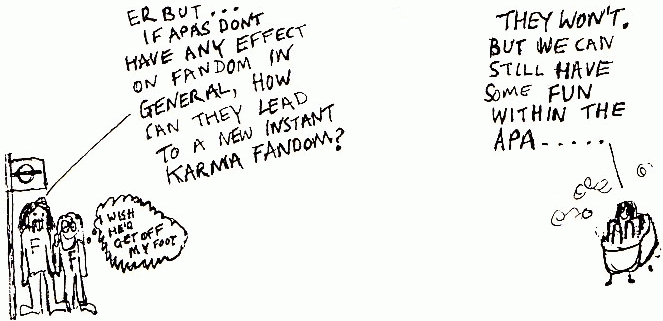[*]
.... how yer keeping? This is the second time I've done this in just over a year; sat down among bundles of lousy first ideas to bash out something for a new apa. It's not as easy as one thinks; you know this, sure, and so does Frances, but what about them yes them out there? →
You know what they're saying, Frank, don't you -- that British fandom is about to be taken over by apas, that fandom as we know it is about to collapse as everyone who's any good simply vanishes into a cloud of elitist apawank, and all that stuff? And you know, and if you don't then Frances is right by your side to remind you, the great counter-argument: that the WPapa, at least, has led to the appearance of millions and millions of triffic new fanzines ... such as ...
Such as? Well, Tiger Tea, and Le nouveau revue bleu, both produced by people with a certain amount of experience in these matters, and the latter not really a new fanzine at all; and SpagJ, only half produced by a WP member anyway; and Pam Wells' Nutz, and something with a silly name from Joy Hibbert. Oh, and Kate Davies' porno extravaganza, which those who've read it reckon to some extent, but which (I suspect) would have come out anyway. Big Deal.
Pull up a chair, Frank, and fix yourself a drink, because this may take some time. The fact is, those who expect the WP or Frank's apa or any other to have any effect at all on fandom in general are probably barking up the wrong creek, because apas and fanzine fandom are different animals, even if they do happen to feature the same people.
OK, Frank? Do you want that freshening up at all? How about some harsh Gradgrindian facts?

FACT 1: The average fanzine comes out about twice a year.
FACT 2: The WP comes out every six weeks, and I would like to see it come out every month; Frank's has yet to agree the matter (but I would like to see it come out every month).
FACT 3: A fanzine, increasingly, is a small, self-sufficient entity, full of the sort of thing that is called in the newspaper world 'timeless' (this means there's no particular reason to read it now, or tomorrow, or any time at all, really). Apazines tend to reach out to the rest of the apa: react to other people's stuff, start conversational hares, etc.
FACT 4: I know which I'd rather read right now.
Stop gazing pathetically at the TV, Frank, there's nothing good on right now -- not even an old American detective series ...

THERE ARE EIGHT MILLION STORIES IN THE
NAKED CITY... and if nobody else knows that, we in fanzine fandom know it in spades. Fandom seems right now (maybe always, I don't know, I'm just a post-Seacon teenybopper who has read one or two old fanzines, but maybe they aren't typical) to be hung up on timelessness, permanence. I mean, it's always struck me that the great thing about the stencil duplicator, and the reason why totalitarian regimes don't like it, is the sheer speed with which a publication can be created on it. Troops shoot strikers at your shipyard? Bang out a stencil or two. Want a worksheet on the Labour leadership election for your sixth-form civics class? Use the duplicator in the resources centre. Want a scandal-sheet to spread a few laughs at the office party? Nip down to the office manager's room after hours.
Yet the chic thing among fanzine fans (who must be about the only major population group left to be into stencil duplication) seems to be the duplicated fanzine that takes about six months to produce. This is not simply a matter of a six-month interval between issues; if there's nothing you want to say during the intervening period, there isn't much point in bringing out a fanzine. No, I'm talking about the fanzine which gets started in April, just after the Eastercon, and comes out just barely in time for the September deadline for the Nova Award.
A good example (though I don't recall if the time-table was exactly as there) was Phil Palmer's TCOL2. Jolly good fanzine; got lots of my votes in the Ansible poll. You can show it to people outside fandom and they will admit that there may be some sort of point to the whole thing. Will go down in the annals of fan history ...
But that's the point, in a way. By the time Hansen and Harvey had finished printing all its 90 zillion pages of innovative graphics and bourgeois-epating prose, TCOL already was fan history. It was kinda disappointing to hold the thing in one's sticky paw, riffle through and discover, that to a large extent it was the same old stories -- anecdotes from the personal histories of fans.
Yes, there was Nick Lowe's lavatory thing, but personally I've never seen what's funny about lavatories, and however well Nick Lowe does it, it will only encourage less talented types to copy it. And, yes, it's timeless. Then there was Phil's own piece about relativity, which I didn't read on the grounds that it might Do Me Good, and where would that leave me? That was timeless too.
(Yes, I confess, I'm doing what one should never do; writing about a fanzine without the Text Itself there on the desk in front of me. Am I going to go into the next room and search for it? Am I hell, Frank, am I hell.)
What I really remember from the prose content of TCOL are Ryman's and Simsa's articles; reminiscences about, respectively, gay clubs and drug busts. Good pieces, both; not at all the usual thing in that respect. But still bloody TIMELESS.

Fandom values the Great Big Article, above the ephemeral current gossip column or short lightweight chat. However much we talk about the delights of in-groupery, what we actually vote for and show newcomers are Bloody Great Blockbusters. And since fans on the whole avoid writing about current events in the world outside ('politics'), and only D West has the energy or whatever to write bloody great blockbusters about fandom itself, we tend to get left with autobiography.
Yes, everyone has a story to tell (and that doesn't only mean fans). But not many of us have more than two or three, or the skill to make endless episodes from our past lives continually transcend tedium. For my money, only Chris Evans can pull the rabbit out of the hat again and again and again and again.

I'm not griping about the type of article where the author uses personal experience to illustrate or make an argument about something larger. The classic case, of course, is "Life with the Loonies I", which has to rank as one of the best fanzine articles of the 80s, and I suspect will still rank as highly in 1989. But it is interesting, to me at least, how far fandom as a whole misread that article, and failed to see just what it was that made it so very special, so different from the usual extract from a teenage opera.
OK, here I go again, No Text To Hand. (See lnrb.) But the structure of LWTL1 is pretty well impressed on my mind, so I don't think I'm going to go too far wrong. The article starts with anecdotes about Atkinson's experience as a social worker dealing with the 'mentally ill'; we see people behaving in various outrageous ways through the eyes of poor harassed Chris who's got her job to do. She is sympathetic, but her position is definitely as one of us, in the 'sane' world, with the additional bind that she is one of the people that we charge with 'protecting' us from 'them'.
THEN the significant thing happens. Atkinson reveals that she is, or used to be, one of 'them' too. And she tells the whole story of Leonard the Archangel with the same detached humour with which she told the stories about other people. The whole thing adds up to an impassioned argument that the 'mentally ill' are human.
What happened? Fandom as as whole ignored the argument and acclaimed the 'personal revelation', coupling LWTL1 with Atkinson's earlier piece about chocolate fudge and sexual fantasies, which seemed to me an exercise in quite a different genre. Alan Ferguson came up with his own set of loonie tunes -- experiences as an ancillary worker in a mental hospital. (And a bloody appalling, tasteless bit of me-tooing it was and all.) Atkinson picked up a well-earned Nova Award, and then ...
... she blew the whole thing by producing LWTL2. (Well, maybe she got the Nova after this came out. One of the minor annoyances of the dominance of the blockbuster over the topical squib is that it's quite hard to check these details of chronology. Even if the text is To Hand. But there is evidence that 2 was written some time after 1 -- in Tappen 3 Malcolm Edwards says that it hasn't been written yet, and the end of 2 deals with responses to 1.)
LWTL2 is not bad as fannish autobiography goes. But it adds nothing to the argument presented in LWTL1; it doesn't have that hook into reality that the first article had; It is just more stories about loonies, and it might as well have been written by Alan Ferguson for all the point it has. All this autobiographizing is just pointless.
Yes, everyone has a story to tell. Yes, people's anecdotes can be entertaining. Yes, Chris Evans does it brilliantly. No, I don't say that anyone who wants to natter on about their student days or a job they once had should be slung out of fandom; I'd have to go myself, for one.
But I would like to see more acclaim for what is unique to the medium we are using: Drunkard's Talk, punted out whenever Edwards wants to stir things up a bit; Drygulch, full of topical references and inconsequential ephemera; Ansible, often distributed on the same day the last page is typed. Yes, I know none of these are exactly languishing unloved in the gutters of fandom, but still, I don't think they're appreciated enough. Let's cover the ground with autumn feuilletons, indulge our momentary whims, and stab each other repeatedly in the back; let's try for a fandom full of surprises, one that doesn't take itself so seriously. And let the big genzines publish only stuff that is genuinely good.
Yes, Frank, you've been around longer than I have and you can tell me it ain't so goddam easy. Yeah, I know all that too. I may not have been in fandom as long as you have, but fandom is not alone in being fairly tedious most of the time, let me tell you. When I was a student we ...
But soft ... I do think an apa is one place where the sunrise element could come off, where instant karma has a chance of taking over. Well, yes, Frank, the WP isn't exactly like that ... but hell, Frank, I know you're a fellow Margaret Welbank fan. And it seems to me that her WP stuff is exactly the sort of Instant fanwriting we need. Yes, The Collected Welbank of 1993 would probably amount to two and a half articles and a comic strip -- all the rest would be bounced out as too time-bound -- but it's good at the time you read it. No, she doesn't write about Burning Fannish Issues, or this morning's Guardian leader, but she's topical all the same. She writes about what's in her head at the moment of writing; if she has second thoughts she amends it all in the margin. Fanzines and their analogues are about the only printed medium capable of such immediacy, so why don't we see it more often?
I mean, we can't all get into Rob Hansen's British Blockbuster Anthology, 2003, so why even try?
Now that is another four-page subject, so I'd better stop. 'Bye, Frank, nice to have seen you. I'd see you to the bus stop but I think I'd rather go and have a bath ...
HELLO FRANK comes from Abigail Frost, 69 Robin Hood Gardens, Cotton Street, London E14, who promises to do something more interesting next time. Produced for FRANK'S APA, with maybe one extra copy for Simon Ounsley, though personally I suggest to him that even if he thinks apas are elitist, it's a lot more elitist to not join one on those grounds but still expect people to send you their apazines just because you are who you are. And where's your bloody fanzine then eh, at least I'm producing something which is more than you are, I made you Ounsley, it was my pen or typewriter that first dubbed you Our Greatest Living Fanwriter (though at this rate it's going to have to assume you're dead) and Simon, I CAN BREAK YOU TOO!
* Extended masthead picture caption: (Under the typing I am wearing a low-cut split-to-the-thigh gown, and boots with knives sticking out of the heels.)
FRANK'S APA 1 (August 1984)
